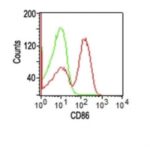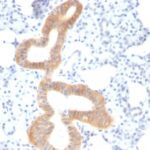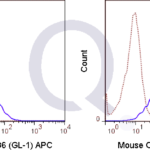Human Anti-CD86 Antibody Product Attributes
Species: Human
Tested Applications: Flow Cytometry.
Application Notes: 5 ul per test where one test represents staining of a cell sample in a final volume of approximately 100 uL. The number of cells within a sample must be experimentally determined, but ranges between 1×105 to 1×108 cells.
Clonality: Monoclonal Antibody
Anti-CD86 Antibody Clone: IT2.2
Clone IT2.2 Host and Isotype: Mouse IgG2b kappa
Buffer and Stabilizer: 10 mM NaH2PO4, 150 mM NaCl, 0.09% NaN3, 0.1% gelatin, pH7.2
Antibody Concentration: 5 uL /test
Storage Conditions: 2-8C protected from light. Stable for 12 Months. Do Not Freeze.
CD86 Previously Observed Antibody Staining Patterns
Observed Antibody Staining Data By Tissue Disease Status:
Tissues from cancer patients, for instance, have their own distinct pattern of CD86 expression as measured by anti-CD86 antibody immunohistochemical staining. The average level of expression by tumor is summarized in the table below. The variability row represents patient to patient variability in IHC staining.
| Sample Type | breast cancer | carcinoid | cervical cancer | colorectal cancer | endometrial cancer | glioma | head and neck cancer | liver cancer | lung cancer | lymphoma | melanoma | ovarian cancer | pancreatic cancer | prostate cancer | renal cancer | skin cancer | stomach cancer | testicular cancer | thyroid cancer | urothelial cancer |
|---|---|---|---|---|---|---|---|---|---|---|---|---|---|---|---|---|---|---|---|---|
| Signal Intensity | ++ | ++ | + | ++ | ++ | + | + | ++ | ++ | ++ | ++ | + | ++ | + | – | + | ++ | ++ | ++ | ++ |
| CD86 Variability | ++ | ++ | ++ | + | ++ | ++ | ++ | ++ | ++ | ++ | ++ | ++ | ++ | ++ | ++ | ++ | ++ | + | + | ++ |
| CD86 General Information | |
|---|---|
| Alternate Names | |
| B7-2, B7.2 | |
| Curated Database and Bioinformatic Data | |
| Gene Symbol | CD86 |
| Entrez Gene ID | 942 |
| Ensemble Gene ID | ENSG00000114013 |
| RefSeq Protein Accession(s) | NP_001193853, NP_001193854, NP_795711, NP_008820, NP_787058 |
| RefSeq mRNA Accession(s) | NM_176892, NM_001206924 NM_006889, NM_175862, NM_001206925 |
| RefSeq Genomic Accession(s) | NG_029928, NC_018914, NC_000003 |
| UniProt ID(s) | P42081, A0A0X9R4E0, A8K632 |
| UniGene ID(s) | P42081, A0A0X9R4E0, A8K632 |
| HGNC ID(s) | 1705 |
| Cosmic ID(s) | CD86 |
| KEGG Gene ID(s) | hsa:942 |
| PharmGKB ID(s) | PA26243 |
| General Description of CD86. | |
| The IT2.2 antibody reacts with human CD86, also known as B7-2, an 80 kDa cell surface protein which is a ligand for CD28, a co-stimulatory receptor for the T cell receptor (TCR). CD28 can also bind a second B7 ligand known as CD80 (B7-1). Both CD80 and CD86 are expressed on activated B cells and antigen-presenting cells. These ligands trigger CD28 signaling in concert with TCR activation to drive T cell proliferation, induce high-level expression of IL-2, impart resistance to apoptosis, and enhance T cell cytotoxicity. The interaction / co-stimulatory signaling between the B7 ligands and CD28 provides crucial communication between T cells and B cells or APCs to coordinate the adaptive immune response.The IT2.2 antibody may be used as a marker for CD86 expression on B cells, macrophages, and dendritic cells. It is reported to be cross-reactive with Rhesus, Cynomolgus and Common marmoset CD86. | |
Selected References
Morgado P, Ong Y-C, Boothroyd JC, and Lodoen MB. 2011. Infect. Immun. 79: 4401-4412. (in vitro stimulation)Kap YS, van Meurs M, van Driel N, Koopman G, Melief M-J, Brok HPM, Laman JD, and t Hart BA. 2009. J. Histochemistry & Cytochemistry. 57: 1159-1167. (Immunohistochemistry – frozen tissue: Rhesus, Cynomolgus, Common marmoset)Teleshova N, Kenney J, Willliams V, Van Nest G, Marshall J, Lifson LM, Sivin I, Dufour J, Bohm R, Gettie A, and Pope M. 2006. J. Leukoc. Ciol. 79:257-267. (Flow cytometry – rhesus macaque)Conti L, Casetti R, Cardone M, Varano B, Martino A, Belardelli F, Poccia F, and Gessani S. 2005. J. Immunol. 174: 252-260. (Flow cytometry, in vitro blocking)Esser MT, Graham DR, Coren LV, Trubey CM, Bess JW, Arthur LO, Ott DE, and Lifson JD. 2001. J. Virol. 75(13)6173-6182. (Western Blot)
Limitations and Warranty
enQuire Bio’s Human Anti-CD86 Monoclonal is available for Research Use Only. This antibody is guaranteed to work for a period of two years when properly stored.

![Anti-CD86 Antibody [IT2.2]](https://cdn-enquirebio.pressidium.com/wp-content/uploads/2017/10/enQuire-Bio-QAB94-PE-100Tests-anti-CD86-antibody-10.png)


![Anti-CD86 Antibody [PO3.1]](https://cdn-enquirebio.pressidium.com/wp-content/uploads/2017/10/enQuire-Bio-QAB93-PE-100ug-anti-CD86-antibody-10-150x150.png)



There are no reviews yet.